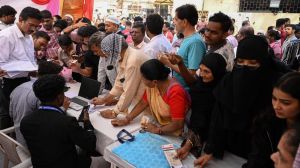PULP WRITES BACK
From K-confessions to cricket romance, snappy tales from new India are taking a burst of first-time authors past the bestseller mark. It8217;s time to say hello to Indian popular fiction in English

From K-confessions to cricket romance, snappy tales from new India are taking a burst of first-time authors past the bestseller mark. It8217;s time to say hello to Indian popular fiction in English
Say, you had to fill a bookshelf entirely with our favourite fun books by Indian writers in English, which ones would you chose? The original bestselling campus novel, Inscrutable Americans, would go right in. If you aren8217;t a literary snob, you would slip in Chetan Bhagat8217;s Five Point Someone there with due reverence. A couple of Shobhaa Des would go in too. A Suitable Boy could scrape in if it weren8217;t so darned long. There is something to be said for Salman Rushdie8217;s humour in Midnight8217;s Children, but that would be really stretching it. That8217;s about it, isn8217;t it? A sad shelf of four, maybe five books. Well, the reason for your scanty collection is that all these years, in all their wisdom, publishers and writers have handed us only The Great Indian Novel. In its pages were all the big issues, from the coming-of-age story of the nation to the plotline of postmodern angst. For that other traveller in us8212;the one hungry for the rollicking good yarn or the silly romance8212;it had nothing. But scan the bestseller lists of the past year and a half, and you8217;ll see your shelf filling up.
Nineteen-year-old Aparajita Walia, an engineering student in Pune, who has taken to reading a few months ago, would place her copy of The Three Mistakes of My Life. The single-in-the-city types would plump for Swati Kaushal8217;s Piece of Cake and the recent bestseller Almost Single 18,000 copies in less than a year by Advaita Kala, if not the rather shrill The Zoya Factor by Anuja Chauhan and the deliciously bitchy Kkrishnaa8217;s Konfessions heading for 5,000 by Smita Jain. The lads would pick all the Bhagats and the IIT/IIM/Corporate novels, spiked with a little cool marijuana of course8212;Amitabha Bagchi8217;s nuanced and well-written Above Average, Ravi Subramaniam8217;s If God Was a Banker and Karan Bajaj8217;s Keep Off The Grass.
NUMBER CRUNCHING
Bajaj8217;s slim paperback about a Washington-based investment banker who descends on the IIM-Bangalore campus to find some good old 8220;meaning in life8221; is the toast of the publishing industry this season. Described by some as the 8220;IIM-wallahs8217; Indian August8221;, it was launched last month bang in the middle of the big launches8212;Amitav Ghosh, Chetan Bhagat, Shobhaa De. Within 10 days of hitting the stores, it sold out its first print run of 5,000 copies. In Indian publishing, that8217;s a big deal because for decades now, that rather modest figure has persisted as the benchmark for a bestseller. The bigger deal is that in the last 18 months, several popular or mass-market books by first-time writers have cantered past that mark, quietly and without the noise of five-star launches. Print runs are up and so are sales figures.
8220;I think the 5,000 figure is really not as much of a threshold anymore,8221; says Kala, whose chick-lit novel is into its sixth reprint. 8220;Almost Single, a debut novel with no Delhi launch or event, sold that figure in about a month.8221; Amitabha Bagchi8217;s Above Average, which was released in February last year, has sold 18,000 copies so far; from Rupa, we have unassuming hits like Subramaniam8217;s If God Was A Banker 50,000 copies and Rajashree8217;s Trust Me 50,000 copies. Stories of runaway success they are not, but they point to a gathering strength in numbers of readers.
Publishers, not surprisingly, are tweaking their book lists to accommodate more snappy tales. 8220;HarperCollins is interested in finding and nurturing a big bunch of writers who can write attractive and entertaining fiction. We want that to be our distinctiveness,8221; says Karthika V, editor, HarperCollins. Other publishing houses are also mining the same world of stories. Of the authors that Westland will publish next year, 15-20 are debut writers; a substantial have a penchant for the easy read. The growing market is also throwing up new towns on the reading map. Sivaraman Balakrishnan, deputy manager, marketing, of Crossword Bookstores, almost splutters in surprise as he tells you that student city Pune is one of the fastest growing centers of popular fiction. Mumbai, Bangalore, Chennai and Delhi are the other cities where books move fast.
THE BESTSELLER PLOT: ONLY CONNECT
All reading is escape. Fiction pulls you out of your reality into another, slightly disturbing, universe. But the pleasure in stories that reflect back your life and its fears, be it dropping grades or finding Mr Right between the two you have the grave concerns of the campus and the chicklit novels is something else. It is what8217;s making the young Indian reader 18 to 35, urban and middle-class give in to the rather unheard of impulse of picking a book over a KFC meal.
It helps that the books are priced just right, Rs 95- Rs 195 and that Indian writers are beginning to tap the many absurdities and obsessions of India8217;s middle class8212;swathes of life that have till now been ignored by 8220;serious writers8221;. There is Smita Jain8217;s insider8217;s account of the K-serial cottage industry in Kkrishnaa8217;s Konfessions. In The Zoya Factor, you have Chauhan bottling a bubbly concoction of IPL, romance and a goodluck charm8212;a Bollywood blockbuster formula if ever there was one. Not surprisingly, many of the bestseller authors have been approached by filmmakers. The campus novels work simply because, yaar, there is no bigger Obsessive Compulsive Disorder in middle class India than A Good Career, na? For the thousands of youngsters who get snapped up the IIT/ IIM-prep factory every year and the hundreds who get in, Chetan Bhagat and Co speak to them in a language they can understand. It is fiction for People Like Us, written by People Like Us.
And we speak like this only.
This is chubby, curly-haired Zoya of The Zoya Factor, brooding about life: 8220;I obsess a little about being 8216;cool8217;, because, hello, when people ask me where I stay I have to look them in the eye and say Karol Bagh8230;Which is agony in advertising because when all the snooty advertising types think Karol-Bagh-type, they imagine a pushy wannabe in chamkeela salwar-kameez with everything matching-matching.8221; No, no postcolonial angst about writing in English here.
Abhijit Bhaduri, whose Mediocre But Arrogant one book that is not embarrassed of its target audience, get the MBA link? was published by a small-time publisher based in Lajpat Nagar, Indialog, and went on to sell 8,000 copies, says, 8220;I think writers have a greater confidence in the language in which we speak8212;and this is a result of the confidence in the idea of India.8221; His next, Married But Available MBA again, has been snapped up by Harper Collins. 8220;I don8217;t need to add a glossary to my book to explain what rosogulla or machher jhol is. I am confident my readers understand. I don8217;t write in chaste English, because we don8217;t speak that way,8221; he says.
Agrees Nilanjana S. Roy, editor of Westland Books, 8220;The more significant change is that neither publishers nor writers are under the pressure of attempting only the big, literary novel. So what we have are stories that emerge from many, different aspects of being Indian.8221;
The stories are set in new India8212;its cafes and multicuisine restaurants, its offices and snarky bosses, not just its exotic spice bazaars. 8220;For years, all the popular fiction we read was set in places we aspired to be in. The exotic locales of Mills and Boons novels, for instance. Now, we have our own aspirational settings to explore,8221; says Karthika. Adds Kala, 8220;It8217;s a quotient emerging from our own experience, not something we import, or blindly turn to the West for.8221;
The literary worth of some of such attempts is questionable and with an accessible, familiar language peppered with Chal yaars and Bindaas boss, comes a lot of bad prose. But Balakrishnan of Crossword Bookstores has a succinct retort. 8220;For critics, the language used by writers like Ravi Subramaniam or Chetan Bhagat might be the biggest weakness. For readers, that8217;s their selling point.8221;
THE AUTHOR, HE8217;S COOL
If the reader has changed, so has the author and the idea of authorial aloofness. Many of the new writers are members of the corporate world. Ravi Subramaniam is a banker as is Karan Bajaj; Kala was a busy hotelier till she chucked it for writing she now works for Time, Chauhan is the ad whiz who gave you lines like Yeh Dil Maange More and Jain was an investment banker before she strayed into the mean world of television scripts. They are aware of the market and how it works8212;and have a business plan to crack it. Renuka Chatterjee, senior vice president of Osian8217;s, The Literary Agency, one of a handful of literary agents who find themselves in business with the publishing boom, recalls how driven Bajaj was while marketing his book. 8220;As an IIM alumnus, he had a huge mailing list and he activated it to send out word of his book. He also had a clear idea of how the book should be pitched. And it did work.8221; Browse Bajaj8217;s website and you will find a step-by-step plan of how to be published in India.
Over an e-mail interview, the author said he was clear he wanted 8220;to write a rocking, entertaining novel hoping it would become 8216;popular8217;. Commercial success is very important for menbsp;since it is a validation that readers thinknbsp;my booknbsp;is entertaining versus just me thinking so.8221;
One thing remains the same. It still doesn8217;t pay enough to make a living. Bagchi, a bestseller writer, got no signing amount from his publisher and has made Rs 2 lakh in a year from sales. That8217;s a piddling Rs 8,000 a month.
THE WISH LIST
For all its newfound zing, the popular fiction market in English language is still not diverse or robust enough as it is abroad. Hello, we don8217;t even have a mystery writer yet. 8220;I have tried and failed to commission a murder mystery,8221; says Roy despairingly. There is some hope in Meenakshi Liddle, another first-time writer who is crafting a detective story set in the Mughal period. Besides an Agatha Christie, we want a homegrown Dick Francis, a Stephen King and a Danielle Steele for the soppy ones. Why not? The shelf has to fill up.
- 01
- 02
- 03
- 04
- 05































